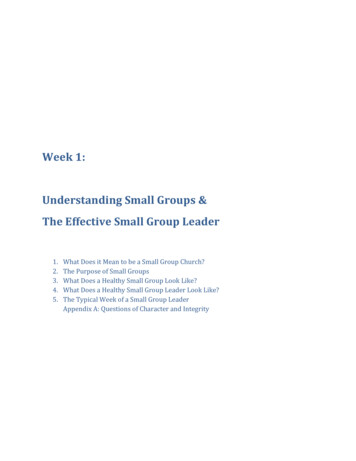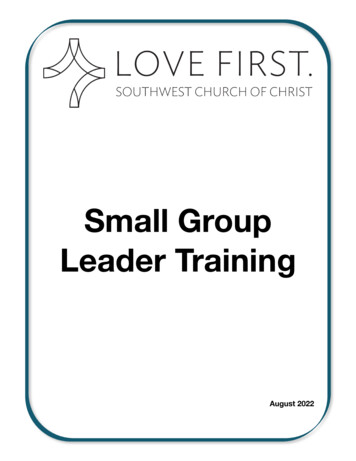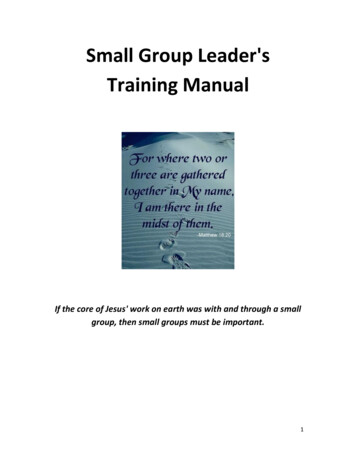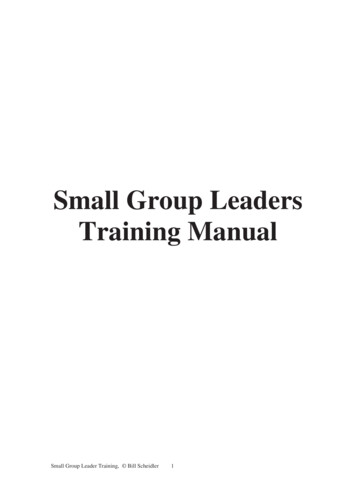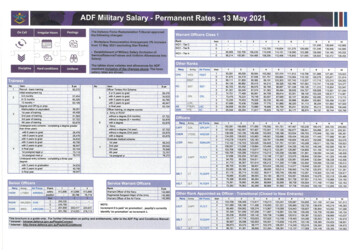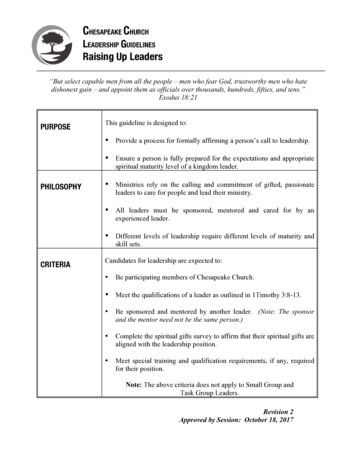
Transcription
Small Group Leader TrainingContents:Pages 2-5 What is a small group?Building RelationshipsGrowing SpirituallyServing OthersPages 6-7 How to succeed as a small group leader.Define vision for your small groupA Successful small group leaderSmall Group guidelinesPage 8 How to launch a small groupPage 12 Small Group FAQ’sPage 19 Recommended Small Group Curriculum1
Thank you so much for considering Small Group Leadership. Small Groups are such an integralpart of our church vision. The Bridge Church is passionate about helping people find andfollow Jesus. This Small Group leader guide is designed to give you the resources you need tomaximize the gifts and passions that God has already placed inside you. It’s exciting to welcomeyou as a Small Group Leader, and it is our privilege to give you the opportunity to help peopleknow Christ and grow in Christ. The goal of this training is to equip and empower you tosuccessfully lead a Bridge Church small group.What is a Small Group?A small group at the Bridge Church, is a gathering of people who seek to helpeach other become more like Christ.The purpose of small groups isn’t to simply have a small group, but a small group is thevehicle for lives to be changed in community.Through small groups, you have the opportunity to build relationships with each other, growspiritually, and serve on mission together. Small groups may be formed around a life stage, atopic, an activity or common interest.Jesus was a small group leader. Jesus spent a majority of His time with the disciples. Adisciple is a follower of Jesus Christ who lives in biblical community and is committed tobecoming more like Him. Through His investment into their life, the early church grew andreached many that were lost. Jesus wanted to invest into their hearts the mission of makingdisciples. Jesus proclaimed the kingdom to large crowds. Likewise, He met with small groupsin homes (Mt. 26:6) and spent considerable time with His disciples. 2,000 years ago, Jesusinvited a handful of men and said, “Follow me.”Small groups were the backbone of the early church, and the same is true today. In the booksof Acts, we read the story of the early church living a new way of life among a newcommunity of Christ-followers.And he said to them, “Follow me, and I will make you fishers of men.” 20 Immediately theyleft their nets and followed him. Matthew 4:19-20 (ESV)2
And Jesus came and said to them, “All authority in heaven and on earth has been given tome. 19 Go therefore and make disciples of all nations, baptizing them in the name of theFather and of the Son and of the Holy Spirit, 20 teaching them to observe all that I havecommanded you. And behold, I am with you always, to the end of the age.” Matthew 28:1820 (ESV)The early church was a movement gathered around a mission.And they devoted themselves to the apostles' teaching and the fellowship, to the breaking ofbread and the prayers. 43 And awe came upon every soul, and many wonders and signs werebeing done through the apostles. 44 And all who believed were together and had all things incommon. 45 And they were selling their possessions and belongings and distributing theproceeds to all, as any had need. 46 And day by day, attending the temple togetherand breaking bread in their homes, they received their food with glad and generoushearts, 47 praising God and having favor with all the people. And the Lord added to theirnumber day by day those who were being saved. Acts 2:42-47 (ESV)The early church had huge impact on the course of history for Christ. Our model for smallgroup ministry is the early church. Small groups were the foundation of the early church.At the Bridge Church, we believe our church must grow larger and smaller atthe same time.We want to make that kind of difference for southwest Florida and the world, and we’redoing it by building a culture disciples who make disciples.“(They met) day after day, in the Temple courts and from house to house.” Acts 5:423
Every Group must provide an opportunity for:1) Building RelationshipsWe want our Small Groups to form genuine relationships with each other so that they cando life together.The small groups in the early church “devoted themselves to the fellowship” and “atetogether in their homes, happy to share their food with joyful hearts.” If you want to grow inyour relationship with Jesus, you need to have intentional relationships with people whohave the same goal—and Small Group is the ideal place for that.We were made to have a relationship with God and with others in the hopes of becomingmore like Christ (Colossians 3.12-17). While we can’t be deeply connected to everyone, wecan be deeply connected to some. When we are open to share, pray, and care for oneanother, our relationships deepen, and we help each other grow (Hebrews 10.24).A new commandment I give to you, that you love one another: just as I have loved you, you also areto love one another. 35 By this all people will know that you are my disciples, if you have love for oneanother.” John 13:34-35“Community matters. That’s about like saying that oxygen matters. As our lungs require air, so oursouls require air, so our souls require what only community provides. We were designed by ourTrinitarian God (who is Himself a group of three persons in profound relationship with each other) tolive in relationship.” Larry CrabbQuestions for a Small Group Leader: How are your friendships with other Christ-followers? How are you serving and caring for other members in your group? In what ministry at our church are you serving in?4
2) Growing SpirituallyWe believe that real Christ-followers grow together (Ephesians 4.1-3).We see that the early church was “devoted to the apostles teaching ” (verse 42). We ask our SmallGroups to study God’s Word (Hebrews 4:12), have Christ-centered discussions, and encourage eachother to become more like Christ in all areas of life (1 Thessalonians 2:8). The key to growing as aSmall Group Leader is to help identify where people are and what it will take to help them get to takethe next step. Regardless of the type of group, the purpose of each one is to create an environmentwhere we can grow to become more like Jesus.We loved you so much that we shared with you not only God’s Good News but our own lives, too. 1Thessalonians 2:8 (NLT)“Studying and applying the Word of God has the power to change us from what we are into whatGod has in mind for us.”Questions for a Small Group Leader: What book or passage have you been studying from God’s Word? What specifically has God been teaching you from that book or passage? How have you been applying what you have learned in everyday life?5
3) Serving OthersSmall Groups serve on mission together in their community and world to bring about the hope ofJesus.Small groups in the early church were “ and enjoying the favor of all the people. And the Lordadded to their number daily those who were being saved. (verse 47).We see the early church being devoted to the Mission of Christ by serving the community, sharingthe Gospel with the lost, and developing future leaders to carry out the mission. We also ask ourSmall Groups to develop future leaders who can in turn impact other people.And let us consider how to stir up one another to love and good works, not neglecting to meet together, as is the habit ofsome, but encouraging one another, and all the more as you see the Day drawing near. Hebrews 10:24-25Our relationship with each other is the criterion the world uses to judge whether our message is truthful. Christian communityis the final apologetic.” Francis SchaefferQuestions for a Small Group Leader: Who is someone that you recently shared the gospel with? How are you serving and reaching out to our city? Who is a family, friend, co-worker, or neighbor that you have not shared the gospel withand when will you do so?How to Succeed as A Small Group LeaderSmall groups leaders are the heartbeat of The Bridge Church.The health of a small group starts with the health of the small group leader. If the group leader isn’tgrowing, you can forget about the small group growing. If you want to gauge the health of the group,put the thermometer in the group leader’s mouth.6
Small groups are key to the health and growth of the church. Small group leaders are responsible forthe vision, direction and support of their small group.Think about it with me —If the group leader is not being honest, why would the group be compelled to honesty?—If the group leader is not living life in integrity, why would the group be compelled to live differently?—If the group leader is not spending time with God regularly, how can she lead others spiritually?—If the group leader is not exercising his prayer life, does he really believe prayer works?So, we tell others about Christ, warning everyone and teaching everyone with all the wisdom God has given us.We want to present them to God, perfect in their relationship to Christ. 29 That’s why I work and struggle so hard,depending on Christ’s mighty power that works within me. Colossians 1:28-29Activity [five minutes]Define the vision for your Small GroupSmall group leaders are responsible for the vision, direction and support of their small group.Take a few minutes and write down your initial thoughts about the vision you have for yourSmall Group. Here are a few questions to get you thinking:What kind of relationships do you picture developing in your group?How would you like to see people grow because of your group?How will the community and world be affected because of your group?A Successful Small Group Leader 7
oooooooooIs a follower of Jesus in a growing relationship with Him.Is passionate about group members growing in their relationship with Jesus.Is committed to Biblical standards.Is actively DEVELOPING a co-leader. This may be the most fulfilling accomplishment ofleadership: helping someone find his/her purpose in God by learning to help others.Cultivates a LIFE-GIVING atmosphere. Be a source of encouragement. You do not needto know all the answers or be the source of all wisdom. The Holy Spirit is there to helpand guide you.Provides care, guidance, and encouragement to the group.Fosters an environment where spiritual growth and genuine friendships take place.Teaches group members how to think and live on mission.Ensures that the group has an opportunity for: Relationships Growth Serving othersSmall Group GuidelinesooooooooWhat is said in group, stays in group (unless you are hurting yourself or someone else).Small Group is a safe place to share.Talk with each other and not at each other.Keep the discussion POSITIVE. Carefully lead the conversation back to the topic whentangents occur. Where sensitive issues or complex questions arise in your group, followup one-on one after the meeting.No side conversations.Men should MINISTER to men and women to women. Couples may minister to a single.Prayer requests are not gossip.Stay on track with the Bible discussion.How to Launch a Small GroupThe Process1. Be a member of the Bridge Church - or be in the membership process with at least 90 daysof regular attendance.2. Complete the Growth Path - or have registered for the next Growth Path class.3. Attend Small Group Leadership Training4. Complete the Small Group Leader Application and one-on-one interview.5. Agree to honor the Small Group leadership expectations.8
1. PrayThis may seem like the cliché churchy thing to state, but studies show that thedifferentiating factor between groups that succeed and those that don’t are not necessarilythe personality of the leader, the location, time, or any typically expected factors. Rather, themost successful groups are those whose leaders spend much time praying for the group andthe people who God will be entrusting them with. Be sure that you ask the Lord to show youwhom to invite and that the Lord opens their hearts and draws them to your group.2. InviteIt’s not surprising that a key part to launching a Small Group is actually having people there!And no, God does not send the Small Group stork to drop a couple of new Small Groupmembers for you. You need to look for them! So, as you pray, invite people from church,friends, family members, neighbors and co-workers. We know this can seem a littlechallenging (and nerve-wracking), but you will be surprised at how God starts opening thehearts of the people. Remember, they won’t come to your Small Group until you invitethem. So, start inviting!3. Set a Launch DateOnce you have prayed and invited people to your Small Group, set a launch date and stayfaithful to it. If a start date is not solidified, the group launch will be dragged on and willnever get off the ground. Whether it’s 10 people, or just you and two other people, makesure you start and watch the Lord add people during the upcoming weeks.Questions? Contact us at smallgroups@tbcvenice.comHow to Develop a Co-LeaderAs a Small Group Leader who embodies the vision of The Bridge Church and where we are going as achurch, it’s our expectation that you are thinking of the next generation of Small Group Leaders. Youare thinking about those in your group that can take the mantle of leadership and step into their ownSmall Group. Thus, we are introducing the role of a ‘Co-Leader’ within our Small Groups.9
DEFINING A CO-LEADER:A ‘co-leader’ is someone who is learning to lead a Small Group by observing and helping with acurrent group. They learn by doing, under the supervision of a seasoned (mature and skilled) leader. Co-leading isclosely related to mentoring – a developmental relationship in which a more experienced personhelps a less experienced person. They grow in maturity along with the rest of the Small Group, but he or she receives specialattention and more pointed direction from the mentoring leader.HOW TO SELECT A CO-LEADER:A Small Group Co-Leader is an emerging leader. This person is someone who has been identified byyou, the group leader, as a good candidate for leading a future group, based on a variety ofobservations. They include, but are not limited to: A growing relationship with Christ and passion for the vision of The Bridge Church. An understanding of the role and the ability to live out the role as defined in the ‘Expectations of agroup Leader’ section earlier in this manual. A person that you would least like to lose from your group. It’s true that the person you would leastlike to lose is probably the person that you need to raise up and send out the most.HOW TO DEVELOP YOUR CO-LEADER:As important as it is to select the right co-leader, it’s equally important to mentor the groupco-leader. Follow these four steps:1. MODEL. Have your Co-Leader watch as you do the ministry, just as Jesus did with hisdisciples (Matthew 9:32–38). Let them see a highly effective Small Group leader in action.2. MENTOR. Next, have your Co-Leader take over some responsibilities or lead variousaspects of the group as you watch, assist, correct, and encourage—again, just as Jesus did withhis disciples (Matthew 10:1).3. MOTIVATE. Encourage your Co-Leader to act on the potential that God has placed insideof them.4. MULTIPLY. Work toward transition. The goal is for the Co-Leader to eventually beconfident enough to lead a group of his or her own. The timeframe and the look of thetransition will vary from group to group; that is okay. The important thing is for the processof development to take place and for new leaders to be raised up.10
Typical Small Group MeetingEstimated Time: 1.5-2 hoursBefore Group: Email, text, or call members the day before meeting and keep communication shortand sweet Preview lesson and discussion questions Pray for your group and group time Make sure your small group environment is clean, presentable, and food is prepared(optional but recommended)During Group: Begin with greeting and fellowship Assign a time-keeper Watch or facilitate the Bible teaching and have gospel-centered discussion. Not allquestions have to be answered to finish the lesson, so just relax and enjoy your group.After Group: After your small group, you can dismiss your group, or choose to handout a bit longer.Make sure you plan a serving project at least once during each quarter. We recommend splitting up men/women for a closing prayer time (set aside 15minutes)11
Small Group FAQ’s1. What should I do if someone asks a question I can’t answer?That will happen! Here is your response. “I appreciate that question(s) and I don’t know the answerto that, but I will do my best to find out this week and get back with you at our next Small Groupmeeting.” Follow up with personal research; call your Small Group Pastor to get advice. You may nothave the answers at that time, but you do have other resources available to help.Helpful website for biblical answers: www.gotquestions.org2. How do I facilitate a Bible discussion?While curriculum is a great place to start with group discussions, it is also helpful to knowthese tips in order to keep a good discussion going as well as to handle awkward or difficultquestions that may arise. Ask open ended questions like "How does that make you feel?" or “What would you do if?” Avoid "yes" or "no" questions. They tend to stop discussion rather than promote discussion. Ask "Why" questions. These make people really evaluate their feelings and thoughts.For example, "Why do you think Jesus said that?" Don't be afraid of silence. Let the group think through what has been said or viewed. Be ready to share first. As the leader, be prepared to be the first person to share. Your openness willencourage others to be open as well. Do your best not to interrupt. Interrupting people makes their future input less likely. Practice the art of listening. Really listen to what others are saying, rather than thinking about whatyou are you are going to say next while they are still talking. Thank people for sharing. This will encourage them to share again. Pre-view the video or printed materials beforehand. Being familiar with the discussion materialbeforehand is a key to keeping the group focused during the discussion period and should be a partof leader preparation. Be flexible. Sometimes other issues need to be discussed even though they are not scheduled. Keep the discussion on topic when needed. Say something like, "Let's refocus for just a minute andtalk about this week's topic.” Treat others with respect. Treat everyone’s comments and questions with consistency. Keep in mindthat there’s no such thing as a “dumb” question or comment. Don’t think you have to be an expert. Remember, leading a Group does not require you to be a Biblescholar, theologian, counselor or any other kind of expert. Be willing to say, “I don’t know.” No one expects you to know everything so be prepared to admitwhen you don’t have an answer. Look it up. When you don’t know an answer to a question, tell the group that you will do a littleresearch and attempt to bring an answer next week. Ask for help. Don’t hesitate to ask another group leader or a staff person for advice or insight.12
3. What if one individual wants to dominate our Small Group discussion time?Establish R.O.E. (Rules of Engagement).When starting a Small Group, or when a new member joins your group, give clear discussionguidelines.Here are two that come to mind.1. What is said in Small Group stays in Small Group. Whether it is a prayer request or a discussionstatement is should remain confidential.2. In open group discussion, please express your thoughts within 1-2 minutes so all can participate. Ifyou feel a person dominates the discussion time then you, as the leader, must react to the situationpositively. Find a place in the conversation as soon as possible and say, “I appreciate your thoughtsregarding this matter, I would like to go to another thought concerning ” then engage others in theconversation.4. How Big Should My Small Group Be?The average Small Group size is 8-12 people, but every group is different. If you lead a married couples’group and have the space to hold 15 couples, great. If you lead a single women’s group in your apartment,you may only be able to hold six people. Your group should be the maximum number of people that youcan accommodate and lead effectively.5. How do I ask others to pray out loud in our group?Start with yourself. Ease into the public prayer arena carefully. Remember there are two things a personfears the most in coming to Small group: reading in front of others and public praying. If you do asksomeone to pray or read in front of others, please talk to them before your group time to be sure it is allright. As your group matures, this will not be as much of an issue as it is for a new group.6. Do we have to eat a meal together every week?Sharing a meal is not a requirement, however we strongly suggest your group eat together as often aspossible. Usually, Small Groups that eat together will stay together for more than one semester.Sometimes sharing a meal is not feasible so we leave it to your Small Group to make the decision. As aminimum we suggest snacks each week. We recommend the host provides the snack the first week asan example to follow the rest of the semester. A sign – up sheet at the first meeting can encourageother group members to commit to bring snacks on a specific week.13
7. How much time do I need to devote as a SG leader?Here are some things that everyone in the group should do, especially the leader:- Contact others in your group for prayer and encouragement.- Preview the materials you are presenting if leading the study or discussion. The average small group meeting takes about an hour and a half with an additional hour forpreparation, phone calls, texts, emails, etc. You are not limited to these amounts. Give as the Lordleads you. Keep in mind that you may need to meet one-on-one with some of your group members who arestruggling or are in need.8. Where and when can I get Small Group Curriculum?We utilize Right Now Media as our main way for groups to use curriculum as well as a recommendedcurriculum list. It can be found on our website: http://tbcvenice.com/rightnow-media9. How can I encourage my Small Group to take next steps at The Bridge Church? Ask each person if they have attended and completed the Growth Path?Encourage everyone to volunteer in a ministry.Invite someone to serve with you if you are part of another ministry.Apprentice two people to lead a Small Group.Pray for our pastors, staff and church family in your Small Group.10. What do we do with the kids?A common question for many Small Groups is, “What do we do with the kids?” Some people thinkthat children in the Group are a blessing, for others having kids present can be distracting, so it’simportant that every Group member clearly understands the arrangements that their group has madefor kids.There are typically three options for every group that faces this question of Kids: Childcare is available for on-site small group. Include the kids in your Group allowing them to answer questions, read Scripture, and pray. Arrange for childcare.14
The information that follows will help your group jointly determine what steps will be taken toaddress the question of childcare. Because the safety of our children is so important, here are twoimportant things to consider when arranging childcare for your Small Group: When Children are "on site,” communicate with your group about the check-in process. When Children are "off-site" (i.e. another house) consider having them supervised by at least tworesponsible individuals at least one of whom is an adult.Keeping these two things in mind, it is also important to plan ahead and make the right childcarechoices for your group so that childcare won’t become a burden. When deciding what to do for yourgroup childcare, these are five important questions for each group member to weigh in on:1. What is the agreed upon childcare approach for our group? No children are present except for nursing infants Group members take turns caring for children We hire a babysitter for the whole group Other options2. Where should our group childcare be? In the same house as the Group, but in a separate room At another location (a babysitter's, neighbor’s, Group member’s house, etc.) Wherever individual parents can arrange it3. If applicable, who will pay for childcare? All of the members who have children The whole group passes around a hat TBC will reimburse 10/hr. per sitter (All sitters will be required to be backgroundchecked by TBC)4. What groups or individuals are available for childcare? Students of Group members "Grandparents"—older family or friends who are willing to help A rotation of members from our own group A rotation of members from other groups that meet on a different night of the week, and then wereturn the favor. Other options5. Who is responsible for lining up the childcare? The Group leader A designated person in each group (possibly the co-leader) Other options15
11. Who should I invite to my Small Group?1. Family and FriendsThere are people who you are close to who need spiritual community in their lives. Some might belooking for a place to discuss the Bible, or they might take interest in our Small Group studies. Make alist of who you think might be interested and invite them to your Small Group!2. NeighborsInviting your neighbors to a Small Group can be a great way to fill your Small Group. Walk outside ofyour house, or apartment, and make it a point to know the names of those who live across from youor next to you. Invite them to your Small Group as a way to reach them for Christ!3. Your Church FamilyThere are people at the Bridge Church who need to be connected to a Small Group. Here are a fewopportunities that you can use at church to invite people to your Small Group:1. People you sit next to in the service.2. People you serve alongside with in a ministry.3. People you meet when you drop off your kids in Bridge Kids.4. People who stand in line for coffee before and after services.12. How do I help prevent conflict?Conflict happens and is a reality that Small Group leaders should be prepared for. By applying thefollowing ideas, you can keep conflict to a minimum and keep minor irritations from becoming majorissues.1. Address issues quickly. If you have an issue with someone, go quickly and talk to them rather thanallowing the issue to grow.2. Use “I” statements when talking about what you are feeling and experiencing. Say, “I get angrywhen” Rather than saying, “You make me mad.”3. Listen closely for underlying messages. Remember tone and body language communicates as muchif not more than the words.4. Try to communicate in person. Try to avoid the use of e-mail, text or phones when conflicts occur.16
13. How do I manage conflict?Conflict is the natural result of people spending time together. In Small Groups conflict should beaddressed rather than avoided. Conflict may occur between group members. Group members willdefinitely experience conflict with people outside the group. When properly handled, conflict canspur groups to a deeper level of intimacy and community.Use the following questions to gain perspective when working through conflict in your Group: Who is involved? What is the issue or concern? What are the needs of the individuals involved? What are be the needs of the whole group? How can this be an opportunity for growth in the following areas?- Relationship with God- Relationship with One Another- Relationship with Self- Relationship with the World What Scripture(s) are relevant to this situation? How can I pray for this situation?14. How do I resolve conflict?While dealing with conflict is difficult to do at times, when handled properly, conflict canbuild intimacy within your group. Matthew 18 should serve as your guide for conflictresolution within your group.Step One: One-on-One Meeting to Seek Reconciliation (Matt 18:15)If you have conflict with someone, go to him or her one-on-one to seek reconciliation. If someone inyour group comes to you to talk about a conflict, they have with someone else in the group, your firstquestion should be “Have you talked to them about it?” If they say no, don’t even listen to the issuebefore they go and attempt to make it right. If they have talked to them then you can move to steptwo.Step Two: Mediator is Included (Matt 18:16)Someone should be included if the problem is not resolved in a one-on-one meeting (or several oneon-one meetings). You, the leader, should serve as mediator for unresolved conflict for your groupmembers. If you, the leader, are involved in the conflict, then the mediator should be a qualified staffmember from your church.17
Step Three: Offense is Made Public (Matt 18:17)In the rare case that the problem cannot be resolved with outside mediation, the offense should bebrought out into public. This can be a discussion among the group as a whole. This should beconsidered as a last resort to restore the relationship, and this step should NEVER be taken withoutfirst gaining consent from a pastor at your church.15. How to develop better listening skills?Listening skills are critical for Group Leaders. Make sure to exercise the following skillswhen you are meeting with your group. As you utilize them, they will become habits, andyou’ll be an even better leader!1. Stop talking. You can’t talk and listen at the same time.2. Don’t interrupt. Interrupting people discourages them and makes it less likely that they willcontribute to your group’s conversations in the future.3. Use body language. Sit or stand up straight and look the other person in the eye.4. Actively listen. Don’t think about what you’re going to say while the other person is talking.5. Listen for themes. Try to identify and understand the speaker’s main idea.6. Be alert. Watch for non-verbal cues that indicate what the
you as a Small Group Leader, and it is our privilege to give you the opportunity to help people know Christ and grow in Christ. The goal of this training is to equip and empower you to successfully lead a Bridge Church small group. What is a Small Group? A small group at the Bridge Church, is a gathering of people who seek to help each other .
